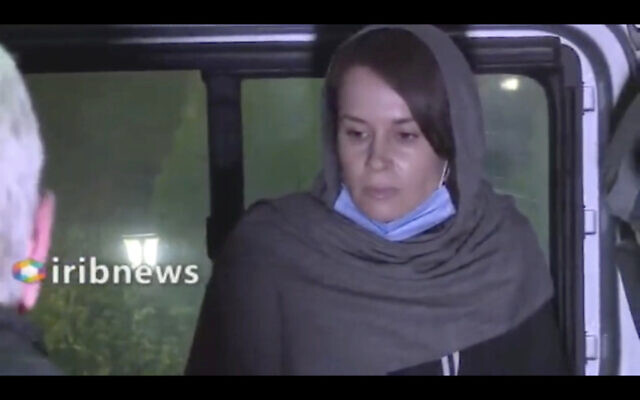British-Australian academic Kylie Moore-Gilbert, who was released by Iran on Thursday in a prisoner swap, was jailed for over two years on spying charges due to her Israeli boyfriend, the Sydney Morning Herald reported on Friday.
Moore-Gilbert, a Middle East politics specialist at the University of Melbourne, was detained in 2018 at the airport in Tehran as she was leaving the country after attending an academic conference after authorities discovered that her boyfriend is an Israeli citizen. She was charged with espionage and sentenced to ten years in prison.
Moore-Gilbert, 33, and the Australian government say that the Iranian allegations that she was spying for Israel have no basis in reality.
The British-Australian was released in exchange for three Iranians being held by Thailand in a prison swap following over six months of negotiations between Australia, Thailand and Iran.
The three Iranians, who were involved in a series of explosions in Bangkok in 2012 that injured five people, returned to a hero’s welcome in Iran. The explosions, a botched attempt to assassinate Israeli diplomats occurred a day after attacks on Israeli diplomats in Tbilisi, Georgia and New Delhi, India, which Israel blamed on Iran.
Israel’s ambassador to Thailand in 2012, Itzchak Shoha, expressed his fury over the Iranian terrorists’ release. “I don’t know anything about this deal beyond what was published,” he told Israel’s Channel 12 News. “It saddens me to see the photos of these [Iranian terrorists] celebrating instead of rotting in prison.”
Shoham added that his only consolation is that at least former Quds Force chief Gen. Qassem Soleimani, whose Quds Force masterminded the plot, was eliminated in January by a U.S. drone strike.
In Bangkok, Thai officials said they transferred three Iranians involved in a botched 2012 bomb plot back to Tehran. While they declined to call it a swap and Iran referred to the men as “economic activists,” the arrangement freed Moore-Gilbert and saw the three men, who were linked to a wider bomb plot targeting Israeli diplomats, return home to a hero’s welcome.
They wore Iranian flags draped over their shoulders, their faces largely obscured by black baseball caps and surgical masks.
Thai police discovered the three Iranians’ plot in 2012 when an accidental explosion blew apart their rented Bangkok villa. At the time, Iran was suspected in two bombing attempts in India and the former Soviet republic of Georgia targeting Israeli diplomats amid heightened tensions over its nuclear program.
Police say one of the Iranians, Saeid Moradi, threw a grenade at officers that bounced backed and exploded, shearing away his legs. Moradi was sentenced to life for attempting to murder a police officer. Another man, Mohammad Kharzei, received a 15-year sentence for possessing explosives. The sentence of the third man, Masoud Sedaghatzadeh, wasn’t immediately known.
Kharzei was the Iranian who was said to have been pardoned this past September, the Thai corrections official said.
Their release along with Moore-Gilbert’s represents another case in which Iran held a Westerner on widely criticized espionage charges. Activists and U.N. investigators believe Iran systematically leverages their imprisonment for money or influence in negotiations with the West. Tehran denies it, though there have been similar exchanges in the past.
Moore-Gilbert was a Melbourne University lecturer on Middle Eastern studies when she was picked up at the Tehran airport as she tried to leave the country after attending an academic conference in 2018. She was sent to Tehran’s notorious Evin prison, convicted of spying and sentenced to 10 years. She vehemently denied the charges and maintained her innocence.
Moore-Gilbert wrote in letters to Morrison that she had been imprisoned “to extort” the Australian government.
Her detention had strained relations between Iran and the West at a time of already escalating tensions, which reached a fever pitch earlier this year following the American killing of a top Iranian general in Baghdad and retaliatory Iranian strikes on a U.S. military base.
International pressure had been building on Iran to release Moore-Gilbert. She had gone on repeated hunger strikes and her health had deteriorated during long stretches in solitary confinement. She also alleged Iran subjected her to “grievous violations” of her rights, including psychological torture.
Moore-Gilbert arrived back in Australia on Friday and will soon reunite with her family after more than two years in prison. She was met by public health officials and members of the Australian Defense Force after leaving her plane at Canberra Airport, less than 24 hours after being released from prison in Iran.
Foreign Minister Marise Payne has said Moore-Gilbert, 33, will have to undergo quarantine due to COVID-19 concerns.
In Australia, Prime Minister Scott Morrison said Thursday he was “thrilled and relieved” that Moore-Gilbert had been released but added that it would take time for her to process her “horrible” ordeal.
“The tone of her voice was very uplifting, particularly given what she has been through,” Morrison told Australia’s Network Nine.
Despite her ordeal, Moore-Gilbert said in a statement that she had “nothing but respect, love and admiration for the great nation of Iran and its warm-hearted, generous and brave people.”
Asked about the swap, Morrison said he “wouldn’t go into those details, confirm them one way or the other.” However, he said he could assure Australians there had been nothing done to prejudice their safety and no prisoners were released in Australia.
(YWN Israel Desk – Jerusalem & AP)











